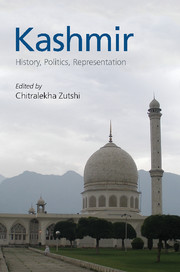Book contents
- Frontmatter
- Dedication
- Contents
- Acknowledgements
- Map 1 Pre-Partition Jammu and Kashmir
- Map 2 Contemporary Kashmir
- Introduction: New Directions in the Study of Kashmir
- PART I HISTORY
- PART II POLITICS
- PART III REPRESENTATION
- 11 Embedded Mystics: Writing Lal Ded and Nund Rishi into the Kashmiri Landscape
- 12 Producing Paradise: Kashmir's Shawl Economy, the Quest for Authenticity and the Politics of Representation in Europe, c. 1770–1870
- 13 The Kashmiri as Muslim in Bollywood's ‘New Kashmir films’
- 14 The Witness of Poetry: Political Feeling in Kashmiri Poems
- Contributors
- Index
11 - Embedded Mystics: Writing Lal Ded and Nund Rishi into the Kashmiri Landscape
from PART III - REPRESENTATION
Published online by Cambridge University Press: 03 August 2019
- Frontmatter
- Dedication
- Contents
- Acknowledgements
- Map 1 Pre-Partition Jammu and Kashmir
- Map 2 Contemporary Kashmir
- Introduction: New Directions in the Study of Kashmir
- PART I HISTORY
- PART II POLITICS
- PART III REPRESENTATION
- 11 Embedded Mystics: Writing Lal Ded and Nund Rishi into the Kashmiri Landscape
- 12 Producing Paradise: Kashmir's Shawl Economy, the Quest for Authenticity and the Politics of Representation in Europe, c. 1770–1870
- 13 The Kashmiri as Muslim in Bollywood's ‘New Kashmir films’
- 14 The Witness of Poetry: Political Feeling in Kashmiri Poems
- Contributors
- Index
Summary
Introduction
The Exemplar of the Gnostics, the Best of Lovers, an Enraptured One among the Partisans of the Reality of God, the Honorable Second Rabi'a, Bibi Lallamaji – the mercy of God be upon her – although she had the form of a woman, she in fact surpassed noteworthy men. One day while traveling naked and passing Hazrat Nur al-Din [Nund Rishi] – may his grave be hallowed – he stood to honor and serve her (Raina 1587, 36a).
Thus begins Muhammad ’Ali Raina's first account of Lal Ded in his Tazkirat al-’Arifin, the earliest known written mention of the famous and revered Kashmiri saint Lal Ded. For those familiar with her legacy, it comes as no surprise that the initial encomium of Lal Ded is immediately followed by her encountering Nund Rishi, for Lal Ded and Nund Rishi are two saints who have been venerated in conjunction with each other in Kashmir for nearly five centuries. In fact, these two mystic saints are so significant to notions of Kashmiri identity that poems attributed to them are often recited to begin Kashmiri cultural events and festivals, and a plethora of institutions in Kashmir have been named after them – from schools and colleges to a maternity hospital and even the Srinagar International Airport, officially named the ‘Sheikh ul Alam Airport.’
Part of the reason that these two mystics carry so much significance for contemporary Kashmiris is that they hearken back to the Kashmiri Sultanate (1320–1586), a period many Kashmiris identify as ‘the last time Kashmiris were ruled by Kashmiris’, which is particularly significant for advocates of Kashmiriyat. The politically charged notion that Kashmir has a unique, non-communal cultural heritage defined as Kashmiriyat is often invoked in an attempt to revive that non-communal Kashmiri culture as a possible means to resolve Hindu-Muslim violence and military conflicts over Kashmir. For advocates of Kashmiriyat and many Kashmiris more generally, Lal Ded and Nund Rishi are viewed as two of the greatest exemplars of Hindu-Muslim communal harmony.
- Type
- Chapter
- Information
- KashmirHistory, Politics, Representation, pp. 247 - 264Publisher: Cambridge University PressPrint publication year: 2017



